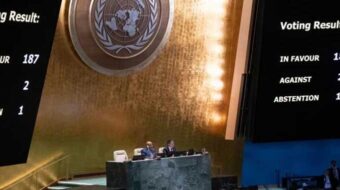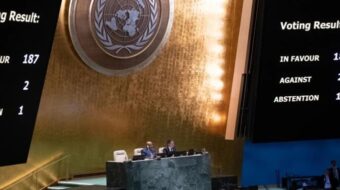In its efforts to upend the Cuban Revolution, the U.S. government has, in recent years, relied upon providing financial support for internal opposition groups and, more recently, on refurbishing a campaign to reach the Cuban people directly. New policy directions, such as slightly eased travel restrictions, notwithstanding, Washington’s enforcement of the economic blockade and the financial isolation of Cuba continues.
Authorized under the 1996 Helms Burton Law, vast amounts of federal money channeled through private and public agencies are dedicated to supporting so-called democracy programs in Cuba. Former Dallas Morning News Havana Bureau Chief Tracey Eaton has studied the recipients of $85 million since 1997. He estimates that $150 million have been spent in all on influencing the politics of a sovereign nation.
Between 1997 and 2009, the International Republican Institute, for instance, absorbed $12,449,194 that the USAID supplied for unclear purposes. The Center for a Free Cuba took in $12,366,326 from various U.S. funding agencies – less $600,000 that were embezzled. Freedom House received $10,589,712 between 1997 and 2010, dedicating $832,323 in 2009 to “New Media Initiatives in Cuba” and $717,455 to “alternative methods to increase information.”
Beginning in 2002, the University of Miami has benefited to the tune of $6,382,567, of which $2,174,074 went to its “Cuba On-Line” effort and $4,208,502 to a “Cuba Transition Project.” Cuba On-Line’s “Newsletter to Cuba” cost $400,000. In 2007-2008, the Institute for Democracy in Eastern Europe received $1,584,746 for its “Democracy in Cuba” program.
This listing touches upon funding habits of only a few recipients of U.S. funds catalogued by Eaton. He details many more that have taken in, each of them, millions of dollars over many years.
The Coral Gables, Fl.-based “Support Group for Democracy” is worthy of special note. Of $6,054,079 that organization spent from 1996 to 2005, only $251,077 is alleged to have arrived in Cuba. Having received $8,270,708 in all, the organization sent high-end consumer goods to friends in Cuba and was accused of credit card irregularities. It dispensed $898,210 to a “Food for Peace Development Assistance Program.”
Accusations of fraud, reckless distribution of funds, and diversion of monies to stateside anti-Cuban groups have prompted temporary stays in disbursement of funds. According to the influential Cuban American National Foundation in 2008, only 17 percent of funds given to Cuban American exile groups for distribution to Cuba actually made it to the island.
A yearlong contract announced Sept. 24 for sending U. S. propaganda to Cuba via text messaging typifies renewed U.S. focus on direct communication with Cubans. The Broadcasting Board of Governors may be paying almost half a million dollars to Maryland’s Washington Software Company to send 24,000 text messages every week to Cuba. Florida-based Radio and TV Marti, Washington’s Cuba broadcasting service, works under the BBG and its International Broadcasting Bureau operating arm. The latter, with access to call numbers of Cuban mobile phone users, is responsible for shaping message content.
Washington Software’s job will be to get outgoing text messages past Cuban barriers. Key words triggering censorship will be replaced with words or characters conveying the intended meaning. Text messaging systems developed for mass marketing, such as this one, are difficult to block. Arriving messages present as if coming from widely varying sources.
This U.S. initiative builds upon recent Cuban and U.S. policy changes. The Cuban government opened up mobile phone use to its public three years ago, the U.S. government permitted U.S. residents to give mobile phones to relatives in Cuba, and in 2009 Washington allowed U.S. companies to sell mobile phones and provide services in Cuba. One million Cubans presently use mobile phones. Cubans avoid high mobile phone usage fees by returning calls later on landlines. Radio and TV Marti is exploiting the fact that mobile phones are used primarily for text messaging.
Over decades Radio and TV Marti has consumed $600 million in U. S. funding. In 2006 that U.S. propaganda arm was found to have paid 10 prominent, supposedly independent Miami area reporters to provide anti-Cuban material for its Cuba broadcasts. Later, Radio and TV Marti faced accusations of paying local commercial broadcasters to run programming intended for Cuba.
Cuba has denounced the U. S. text messaging project as illegal. Indeed, the International Telecommunications Convention of 1982, signed by 140 nations including the United States, allows member nations to block international telecommunications, which are seen as endangering state security or violating national laws.












Comments